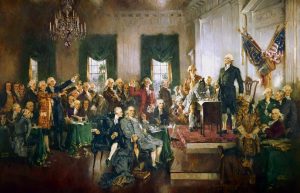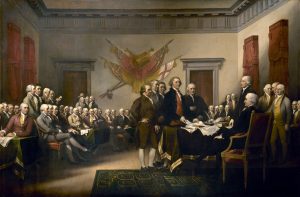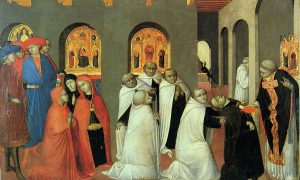And the Lord said to Samuel, “Obey the voice of the people in all that they say to you, for they have not rejected you, but they have rejected me from being king over them. According to all the deeds that they have done, from the day I brought them up out of Egypt even to this day, forsaking me and serving other gods, so they are also doing to you. Now then, obey their voice; only you shall solemnly warn them and show them the ways of the king who shall reign over them. – 1 Samuel 8:7 – 9
In a previous post, we discussed a biblical foundation for supporting the separation of church and state. God desires that his church be kept separate from the world so that it may be kept holy. In another post called “Can you Christianize a Nation?” We briefly discussed the warning against kings that God gives the people of Israel (1 Samuel 8:10 -22). It is worth looking at what happens after this warning.
The Sins of a King
The people ignore God’s warning and continue to demand a king. So God gives them a man named Saul who is among the most handsome in Israel (1 Samuel 10:9-27). Saul’s reign is punctuated by a rebellion against God which leads to the fall of his kingdom. The first of these rebellions we see as Saul and his armies are preparing for a battle. Before they could begin the battle the people needed to offer a sacrifice, but the high priest Samuel was late, and Saul’s men were growing impatient. So Saul offers the sacrifice himself, overstepping his authority. It is here that God turns his back on Saul, declaring that his kingdom will not endure and that a new man will be made king, a man who God says is “after his own heart” . (1 Samuel 13:13-14)
There are two things to note. First, this passage once again supports what we see in Judges. The governing authorities often reflect the hearts of the people, not the other way around. Saul gives the improper burnt offering, acting on his fear and impatience, reflecting the people who were dispersing because of their own fear and impatience.
Second, this also reinforces the separation of the positions of King and High Priest that we see in the law. Many may be tempted to say I am reading my own biases and worldview into the text. It is fair to be cautious but as we continue to look at the life of Saul we will see this clear separation is not superficial or coincidental, it is purposeful. For this single act of rebellion was enough for God to punish Saul severely. “”You have done a foolish thing,” Samuel said. “You have not kept the command the Lord your God gave you; if you had, he would have established your kingdom over Israel for all time. But now your kingdom will not endure; the Lord has sought out a man after his own heart and appointed him ruler of his people because you have not kept the Lord’s command.” (1 Samuel 13: 13-14)
Even still, this is only the first of Saul’s failings. Saul oversteps his role again when God commands Saul to wipe out the Amalekites and all their livestock. Rather than doing what God commands, Saul instead saves the best of their sheep and tries to offer livestock raised by pagans as burnt offerings to the Lord. Rebelling against God by ignoring his commands and once again overstepping his role as King by performing the work of a priest. This improper worship is so wicked and abominable that God compares Saul’s sins to Sorcery. “For rebellion is like the sin of divination, and arrogance like the evil of idolatry. Because you have rejected the word of the LORD, he has rejected you as king.” (1 Samuel 15:23)
The House Began to Pitch
Do not think this is an exaggeration for poetic impact. As punishment, Saul’s kingship is completely rejected by the Lord and God hands Saul over to his sin completely. Saul becomes plagued by Evil Spirits, which inflict harm upon him and cause him to spout prophecy.(1 Samuel 16:14 – 23) We see similar things happening to practitioners of the Occult throughout scripture. (Mark 5:1-20, Matthew 17:14 – 20, Acts 16:16 – 18)Saul’s rebellion is compared to witchcraft, and then God allows demons to do with Saul as they do to witches. Inflicting upon him pain and suffering and forcing him to babble prophecies for all to hear.
Despite these curses and the anger of the Lord, Saul continues in his refusal to respect the authority of the priesthood. As Saul hunts for David, he demands that the priest Ahimelech aid him in finding the future king. When the priest refuses to betray God’s anointed, Saul orders his bodyguards to slaughter them. Killing eighty-five of God’s priests in one day.
Juxtaposed to this is David, who had hidden among bandits in the wilderness for years because Saul sought to kill him. Yet when Saul is literally caught with his pants down and David has the opportunity to kill him, the future King refuses. saying to his men, “The Lord forbid that I should do this thing to my lord, the Lord’s anointed, to put out my hand against him, seeing he is the Lord’s anointed.” (1 Samuel 24:6)
Conclusion
Once again, we must remind ourselves that the separation of church and state is Holy and Righteous. Corporate Worship is to be set aside and venerated as separate from the things of this earth. This truth is declared by the law, strengthened by the writing of the apostles, and cemented in the teachings of the king of kings, Christ our Lord. “And Jesus said to them, “Whose likeness and inscription is this?” They said, “Caesar’s.” Then he said to them, “Therefore render to Caesar the things that are Caesar’s, and to God the things that are God’s.” (Matthew 22:20 – 22)
We form nations because we yearn for Justice, discipline, and authority. It is the law of God that is written on our hearts. We elevate Kings over us because we feel a deep desire for the good things of God. We crave his authority even as we rebel against his authority. The church, however, was not formed by man but by God, so that the faithful may worship and cherish him as is good. Do not think that keeping the church separate from the things of this world is unimportant. It is an essential part of proper and holy worship as God commands.




One Response